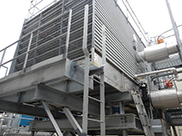
Cooling towers are often used with air conditioning systems to make large commercial buildings feel comfortable. They are also used for cooling industrial processes that create a lot of heat. Cooling towers work by circulating water through pipes to remove unwanted heat.
Cooling towers release water at times, for instance, during maintenance. The water may contain chemicals to prevent algae, corrosion and scale; heavy metals; sediments; and other pollutants. These pollutants can harm fish and wildlife and degrade water quality if they flow into the storm drainage system or local streams.
Fairfax County must approve cooling tower connections to the public sanitary sewer or the county storm drainage system, which are two separate systems. Water released from a cooling tower is not allowed to flow into the storm drainage system unless it complies with state and local water quality regulations.
The Virginia Pollutant Discharge Elimination System (VPDES) permit program limits the amount of pollutants that are allowed to flow into state waters. Under the program, Virginia Department of Environmental Quality (DEQ) issues permits for noncontact cooling water discharges; that is, cooling water that does not come in direct contact with raw materials, products or wastes. Permittees need to pay permit registration fees, monitor discharges from their cooling towers and submit monitoring reports.
The Erosion and Stormwater Management Ordinance (Chapter 124.1 of the Fairfax County Code) prohibits discharges of non-stormwater to state waters unless the discharge is authorized by a state permit. Any unauthorized discharges to state waters through the county storm drainage system is considered an illicit discharge. Owners of existing cooling towers are required to correct violations in a timely fashion. If uncorrected, a violation may result in a civil penalty in an amount not to exceed $32,500 according to the County Code Section 124.1-8-3. Each day of a violation constitutes a separate offense.
Cooling Tower Fact Sheet
Fairfax County has prepared information to help owners and operators of cooling towers to comply with state and local water quality regulations.
Cooling Towers: Options for Property Owners

